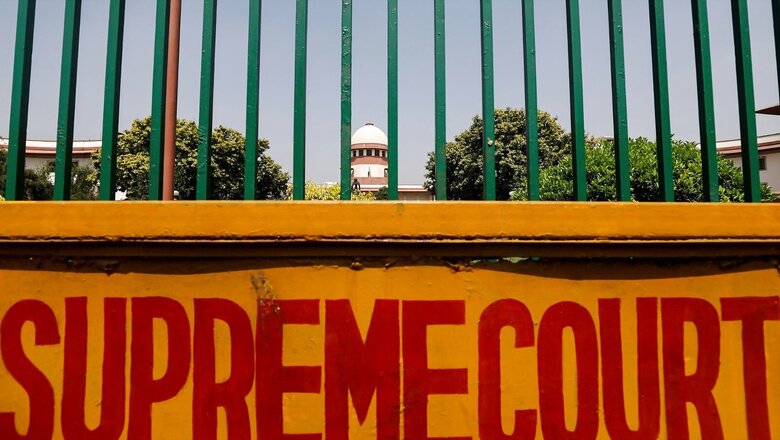
views
The Supreme Court said on Thursday the collegium system of appointment of judges is the law of the land and comments against it are “not well taken”. The apex court observed that any law declared by it is “binding” on all stakeholders and the collegium system must be followed.
The top court was hearing a matter relating to alleged delay by the Centre in clearing the names recommended by the collegium for appointment as judges to constitutional courts. Observing that comments made on the Supreme Court collegium by the government functionaries are “not well taken”, a bench headed by Justice S K Kaul asked Attorney General R Venkataramani to advise the government about it.
“Comments on the Supreme Court Collegium by government functionaries etc are not well taken… You have to advise them, Attorney General, to control their..,” Justice Vikram Nath said, according to a report by the Tribune.
The comments came after Supreme Court Bar Association President Vikas Singh had complained that statements were being made against the apex court. “Persons in constitutional posts are saying the Supreme Court does not have the power to exercise judicial review. That’s a part of the basic structure of the Constitution. It’s a little upsetting,” Singh had told the Bench.
“Tomorrow people will say basic structure is also not a part of the Constitution,” Justice Kaul commented in response to Singh’s oblique reference to the Vice President’s statement.
Union Law Minister Kiren Rijiju had on November 25 launched a fresh attack, saying the collegium system is “alien” to the Constitution. Vice President Jagdeep Dhankar too, in his maiden speech as Rajya Sabha chairman, questioned the scrapping of the NJAC.
The collegium system has become a major flashpoint between the Supreme Court and the central government, with the mechanism of judges appointing judges drawing criticism from different quarters. News18 explains what the row is and what ‘judicial review’, a concept that has come up during the arguments, entails:
What SC Said:
On Thursday, while ruling on a petition against the Centre’s sitting over collegium recommendations, the Supreme Court stated that the scheme of the Indian Constitution is such that, while the law-making power is with Parliament, it is subject to the scrutiny of the Judiciary.
On November 28, the apex court had expressed anguish over the delay by the Centre in clearing the names recommended by the collegium for appointment as judges to the higher judiciary, saying it “effectively frustrates” the method of appointment.
It had said a three-judge bench of the apex court had laid down the timelines within which the appointment process had to be completed. Those timelines, it had said, have to be adhered to.
Justice Kaul had observed it appeared the government was unhappy with the fact that the National Judicial Appointments Commission (NJAC) Act did not pass the muster, but that cannot be a reason to not comply with the law of the land.
The apex court had in its 2015 verdict struck down the NJAC Act and the Constitution (99th Amendment) Act, 2014, leading to the revival of the Collegium system of existing judges appointing judges to constitutional courts.
What Govt Has Said:
Rajya Sabha Chairman Jagdeep Dhankar on Wednesday raised the issue of the Supreme Court striking down the NJAC act during his maiden speech in the House. “A glaring instance of severe compromise of Parliamentary sovereignty and disregard of the mandate of the people,” he said.
He said power of the House is supreme and using this Constitutional power to amend, Parliament effected wholesome structural governance changes to further spinally strengthen democracy. This has been by way of incorporation of Part IX, IX A and IX B in the Constitution providing a comprehensive mechanism for Panchayati Raj, Municipalities and Co-operative Societies. In a similar vein, Parliament in a much needed historic step, passed the 99th Constitutional Amendment Bill paving way for the National Judicial Appointment Commission (NJAC).
“This historic parliamentary mandate was undone by the Supreme Court on October 16, 2015 by a majority of 4:1 finding the same as not being in consonance with the judicially evolved doctrine of ‘Basic Structure’ of the Constitution.
“There is no parallel to such a development in democratic history where a duly legitimised constitutional prescription has been judicially undone. A glaring instance of severe compromise of parliamentary sovereignty and disregard of the mandate of the people of which this house and the Lok Sabha are custodians.”
What Is Judicial Review?
Judicial review is the power granted to the judiciary by the constitution to examine legislative enactments and executive orders of governments, whether state or central. This doctrine originated in the United States of America, where it was advanced in the case of Marbury vs Madison, a report by India Today explains.
The idea was conceived by John Marshall, then Chief Justice of the United States Supreme Court. However, as previously stated, such authority is granted to the judiciary by the Indian Constitution. Both the country’s supreme courts and high courts have the right to judicial review.
The courts also have the authority to declare any law passed by the legislature null and void if it violates the constitution and cannot be imposed by the government.
Is Judicial Review Subject to Any Limitations?
Judicial review is not absolute because certain conditions must be met in order to challenge any law in the supreme or high courts, i.e., a law can be challenged only if:
- The aforementioned law violates the fundamental rights guaranteed by the constitution.
- The aforementioned law violates the provisions of the constitution.
- The law that has been enacted exceeds the jurisdiction of the authority that drafted it.
Different types of judicial review
Justice Syed Shah Mohamed Quadri famously classified judicial review in India into three broad categories.
- Judicial review of constitutional amendments.
- Judicial review of legislation by the parliament and state legislatures expands to subordinate legislation.
- Judicial review of administrative actions of the union and state expanding up to authorities under the state.
Read all the Latest Explainers here




















Comments
0 comment